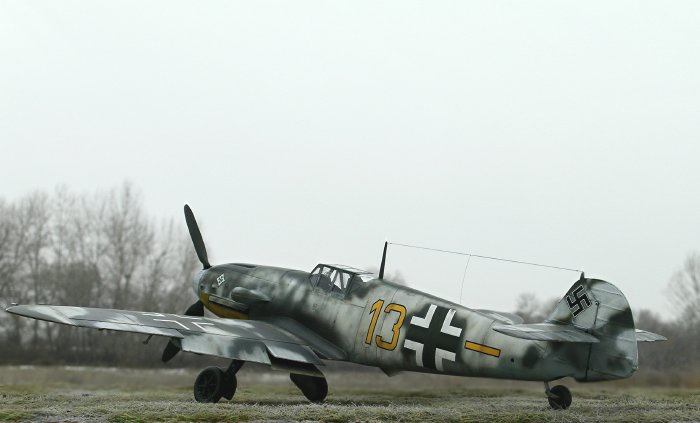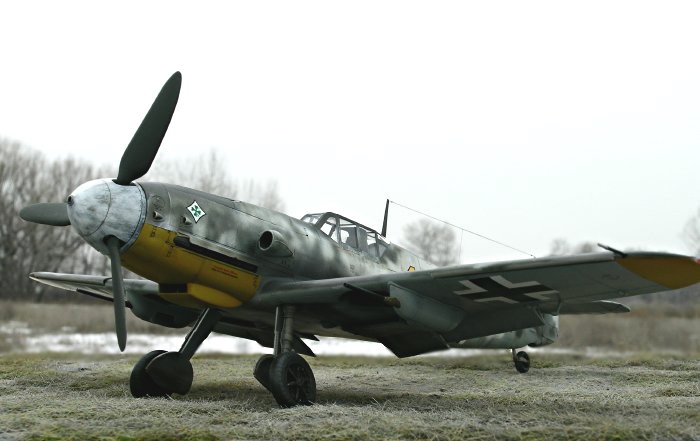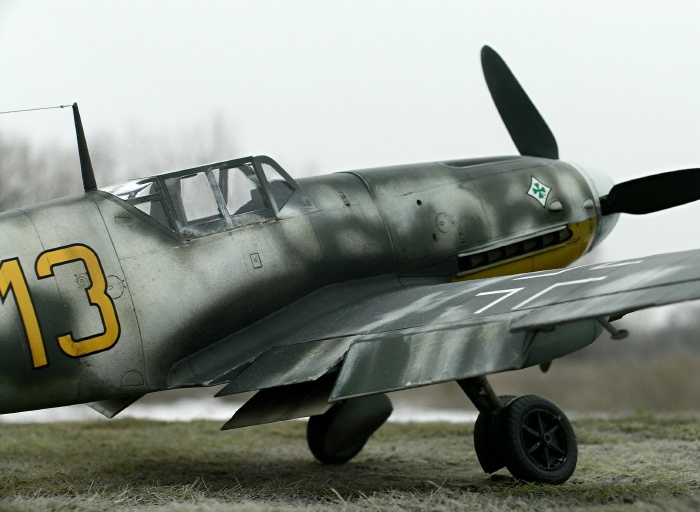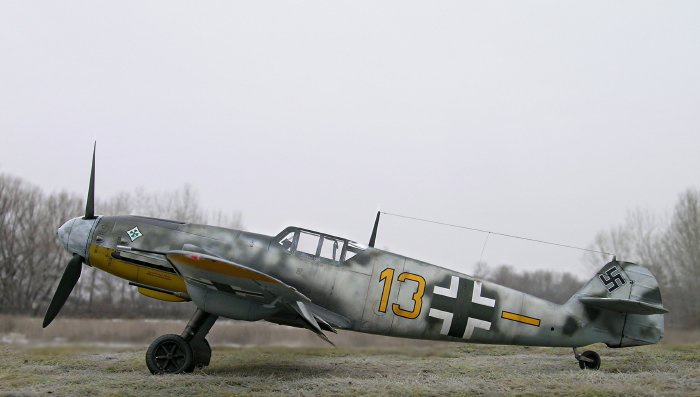|
1/32 scale ProModeler
backdate
Messerschmitt Bf
109G-2
by
Ian Robertson
|
 |
|
Messerschmitt Bf 109G-2 |

ProModeler's
1/32 scale Messerschmitt Bf 109G-4
is available online from Squadron.com
This model depicts a Messerschmitt Bf.109G-2 from JG 5 in Finland
during the winter of 1943. The scheme on this 1/32 Pro-Modeler kit is
based loosely on a photograph in Bergström and Pegg’s book, “Jagdwaffe:
The War in Russia, November 1942 – December 1943”, Vol. 4(3) in the
Jagdwaffe series by Classic Colours.

The photograph (pg 281) shows the aircraft from behind with only the
patchy winter camouflage on its wings clearly visible, so I relied on
other examples of winter camouflage on Bf.109’s to complete my project.
Backdating a G-4 to a G-2
Converting the Bf.109G-4 into a G-2 is a simple procedure. I replaced
the kit’s main tires with a narrower style of tire produced by Aires for
their Bf.109F conversion (the F tire is appropriate for the G-2, and can
be purchased from Aires as part of the F conversion set or on its own).
With the narrower tire, the teardrop-shaped fairing on the upper surface
of each wing should be deleted.

I replaced the kit’s tail wheel assembly with MDC’s tail wheel and yoke
for the G-6 (it’s close enough for me). The replacement wheel assembly
was modified by removing the dust cover and adding a piece of rigid wire
for the strut. Because most G-2s had a retractable tail wheel, I opened
the wheel well and added stiffeners using strip styrene around the
edges.
The position of the fuselage antenna lead-in was different between the
G-2 and G-4 due to the use of different radio equipment. Specifically,
the antennae lead-in on the G-2 entered on panel 5 rather than panel 7.
The antenna wire on my model was made from stretched sprue.
I removed the air vent located on the port side below the windscreen as
this was present only on later G-2s.
Other Modifications
-
MDC cockpit and spinner
-
Seatbelts made from lead foil with
MDC buckles
-
Cutting Edge exhausts
-
Covers at base of wing cannons were
made from bare metal foil
-
Decals from EagleCals and Cutting
Edge
 The
model was painted in a standard scheme of RLM74/75 over 76 using Polly
Scale acrylics. Prior to the application of the base camouflage, the
lower cowl and wingtips were painted yellow and masked until all other
painting was complete. The
model was painted in a standard scheme of RLM74/75 over 76 using Polly
Scale acrylics. Prior to the application of the base camouflage, the
lower cowl and wingtips were painted yellow and masked until all other
painting was complete.
A number of steps were followed to create the winter distemper effect.
First, I used a 3mm wide flat-edged brush to apply white Polly Scale
acrylic straight from the bottle to the areas I wanted covered in
distemper. I made no effort to apply the paint evenly, and I kept the
coverage thin over the model’s surface.
Once the paint dried I sanded it with a micromesh sanding cloth to
remove any unwanted thickness. Next, I applied white Tamiya acrylic
(with a touch of black) over the areas that were roughed-in with the
brush, making sure to leave a hint of the uneven coverage produced by
the brush. I found that the Tamiya white covered better in this role
than Polly Scale white.

On the fuselage sides I sprayed patches of RLM80, particularly in the
region of the Balkenkreuz and on the cowl.
To remove the clean and fresh look of the white distemper, I sprayed a
highly thinned mixture of black and burnt umber paint over the model's
surfaces, both upper and lower. Once the paint was dry, I used medium
and fine grain sandpaper to scuff the distemper and in some places
expose the camouflage beneath. Additional washes of raw sienna mixed
with burnt umber (Model Master enamels) were applied with a soft brush.
A clear coat of Future was applied prior to the addition of decals. Once
the decals were dry I added a clear dull coat mixed from equal amounts
of Polly Scale clear flat and clear satin. Some weathering of the decals
was done so that they conformed to the general appearance of the
aircraft.
As luck would have it, a brief flurry of snow came to Boise early in
January 2005 on a morning when I could get out to take photographs. In
preparation for the photo-shoot, I took my standard base with artificial
grass from Heki (item # 1574 - Wild Grass Savanna) and misted it with a
coat of Tamiya buff acrylic followed by Tamiya white acrylic. This gave
the grass a frosty winter appearance, perfect for the conditions
outside. While the colors on the model are muted by the lighting
conditions in the photos, I hope you’ll agree that the dreary conditions
capture the right mood for this paint scheme. I’ve added a few pictures
taken on a sunny day to show the markings on the model more vividly.
Click on the thumbnails
below to view larger images:
Slovakian and Bulgarian
Aces of World War 2
Aircraft of the Aces 58 |
|
|
|
|
Author: Jiri Rajlich
Illustrator: John Weal
US Price: $19.95
UK Price: £12.99
Publisher:
Osprey Publishing
Publish Date:
February 25, 2004
Details: 96 pages; ISBN: 1841766526 |
|
|
Model, Images and Text Copyright ©
2005 by Ian Robertson
Page Created 18 February, 2005
Last Updated 17 February, 2005
Back to HyperScale
Main Page
|
Home
| What's New |
Features |
Gallery |
Reviews |
Reference |
Forum |
Search